初中英语状语从句讲解、练习与答案之欧阳文创编
(完整)初中英语状语从句讲解、练习与答案

状从句状从句用来修主句中的,副和形容的从句叫状从句。
根据其含状从句可分状从句,地点状从句,条件状从句,原因状从句,果状从句,比状从句,目的状从句,步状从句。
1. 状从句(1)状从句常用when, as, while, before, after, since, till, until, as soon as 等来引。
例如:It was raining hard 〔rain hard下大雨〕when got to school yesterday.While he was doing his homework, the telephone rang.As he walked along 〔沿着走〕the lake, he sang happily.He had learned a little Chinese before he came to China.After he finished middle school, he went to work in a factory.(2)在状从句里,通常不用将来,用在表示将来的作或状。
例如:I ’ ll ring you up as soon as I get to New York.I will tell him everything when he comes back.He won’ t believe it until he sees it with his own eyes.(3)在有 till 或 until 引的状从句的主从复合句里,如果主句用肯定式,其含是“一直到⋯⋯〞,只能用延性。
如果主句用否认式,其含是“直到⋯⋯ 才⋯⋯〞,“在⋯⋯以前不⋯⋯〞 , 可用瞬。
例如:The young man read till the light went out〔熄〕.Let ’ s wait until the rain stops.We won’ t start until Bob comes.Don’ get off 〔从下来〕until the bus stops.【Till 是指直到某一特定事件生的候,而在那个刻之后,事情或状况仍将持。
初中状语从句讲解及习题附答案

初中状语从句讲解及习题附答案(一)状语从句概述定义状语从句用作状语,是起副词作用的句子。
位置状语从句可以放在主句之前,也可以放在主句之后,时间、条件、原因和让步状语从句放在句首时需要用逗号和主句隔开。
分类根据其作用可以分为时间、地点、原因、条件、目的、让步、方式和比较等状语从句。
作用它可以修饰谓语、非谓语动词、定语、状语和整个句子。
(二)状语从句详解1、时间状语从句引导词用法示例when意为“当…的时候”。
When引导从句的谓语动词可以是延续性动词,也可以是瞬间动词。
并且when有时表示“就在那时”A liar is not believed when he speaks the truth、说谎者讲真话时也没有人相信。
When he arrives, I’ll call you、When you laugh and smile, your body relaxes、 while意为“在…的时候,在…的同时”。
While引导从句的谓语动词必须是延续性的,发生时间较长,并强调主句和从句的动作同时发生(或者相对应)。
While有时还可以表示对比。
While I was standing at the window, I saw several boys running along the street、 While John was watching TV, his wife was cooking、 as意为“一边…一边…”。
As引导的动作是延续性的,发生时间较短,一般用于主句和从句动作同时发生;as也可以强调一前一后。
The writerwas angry as he was travelling on a train to London because someone had invaded his “space”、He smiled as he stood up、 after意为“在…之后”。
初中英语状语从句讲解、练习与答案(教案)汇编
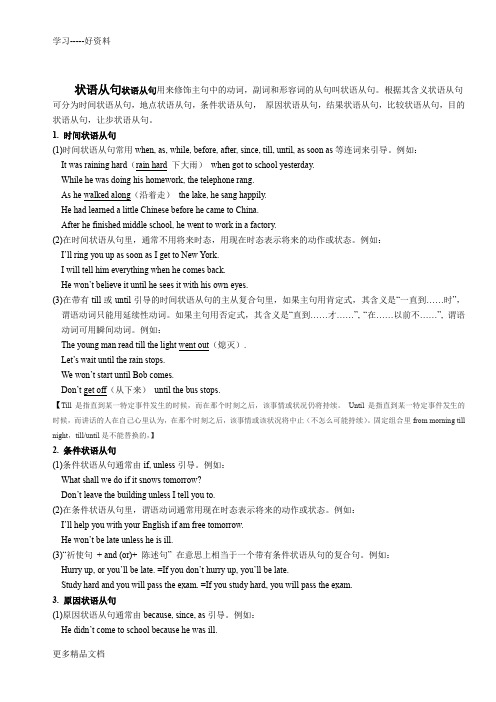
状语从句状语从句用来修饰主句中的动词,副词和形容词的从句叫状语从句。
根据其含义状语从句可分为时间状语从句,地点状语从句,条件状语从句,原因状语从句,结果状语从句,比较状语从句,目的状语从句,让步状语从句。
1. 时间状语从句(1)时间状语从句常用when, as, while, before, after, since, till, until, as soon as等连词来引导。
例如:It was raining hard(rain hard 下大雨)when got to school yesterday.While he was doing his homework, the telephone rang.As he walked along(沿着走)the lake, he sang happily.He had learned a little Chinese before he came to China.After he finished middle school, he went to work in a factory.(2)在时间状语从句里,通常不用将来时态,用现在时态表示将来的动作或状态。
例如:I’ll ring you up as soon as I get to New York.I will tell him everything when he comes back.He won’t believe it until he sees it with his own eyes.(3)在带有till或until引导的时间状语从句的主从复合句里,如果主句用肯定式,其含义是“一直到……时”,谓语动词只能用延续性动词。
如果主句用否定式,其含义是“直到……才……”, “在……以前不……”, 谓语动词可用瞬间动词。
例如:The young man read till the light went out(熄灭).Let’s wait until the rain stop s.We won’t start until Bob comes.Don’t get off(从下来)until the bus stops.【Till是指直到某一特定事件发生的时候,而在那个时刻之后,该事情或状况仍将持续。
中考英语三大从句(宾语从句、状语从句、定语从句)之欧阳术创编
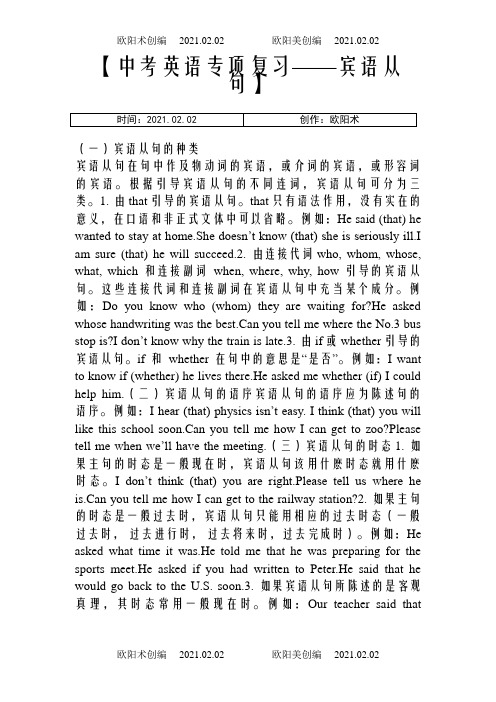
【中考英语专项复习——宾语从句】(一)宾语从句的种类宾语从句在句中作及物动词的宾语,或介词的宾语,或形容词的宾语。
根据引导宾语从句的不同连词,宾语从句可分为三类。
1. 由that引导的宾语从句。
that只有语法作用,没有实在的意义,在口语和非正式文体中可以省略。
例如:He said (that) he wanted to stay at home.She doesn’t know (that) she is seriously ill.I am sure (that) he will succeed.2. 由连接代词who, whom, whose, what, which和连接副词when, where, why, how引导的宾语从句。
这些连接代词和连接副词在宾语从句中充当某个成分。
例如:Do you know who (whom) they are waiting for?He asked whose handwriting was the best.Can you tell me where the No.3 bus stop is?I don’t know why the train is late.3. 由if或whether引导的宾语从句。
if和whether在句中的意思是“是否”。
例如:I want to know if (whether) he lives there.He asked me whether (if) I could help him.(二)宾语从句的语序宾语从句的语序应为陈述句的语序。
例如:I hear (that) physics isn’t easy. I think (that) you will like this school soon.Can you tell me how I can get to zoo?Please tell me when we’ll have the meeting.(三)宾语从句的时态1. 如果主句的时态是一般现在时,宾语从句该用什麽时态就用什麽时态。
初中英语状语从句讲解、练习与答案
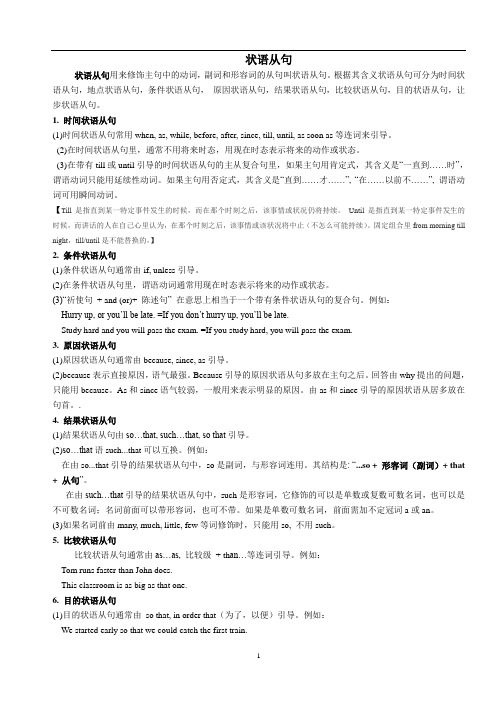
状语从句状语从句用来修饰主句中的动词,副词和形容词的从句叫状语从句。
根据其含义状语从句可分为时间状语从句,地点状语从句,条件状语从句,原因状语从句,结果状语从句,比较状语从句,目的状语从句,让步状语从句。
1. 时间状语从句(1)时间状语从句常用when, as, while, before, after, since, till, until, as soon as等连词来引导。
(2)在时间状语从句里,通常不用将来时态,用现在时态表示将来的动作或状态。
(3)在带有till或until引导的时间状语从句的主从复合句里,如果主句用肯定式,其含义是“一直到……时”,谓语动词只能用延续性动词。
如果主句用否定式,其含义是“直到……才……”, “在……以前不……”, 谓语动词可用瞬间动词。
【Till是指直到某一特定事件发生的时候,而在那个时刻之后,该事情或状况仍将持续。
Until是指直到某一特定事件发生的时候,而讲话的人在自己心里认为,在那个时刻之后,该事情或该状况将中止(不怎么可能持续)。
固定组合里from morning till night,till/until是不能替换的,】2. 条件状语从句(1)条件状语从句通常由if, unless引导。
(2)在条件状语从句里,谓语动词通常用现在时态表示将来的动作或状态。
(3)“祈使句+ and (or)+ 陈述句” 在意思上相当于一个带有条件状语从句的复合句。
例如:Hurry up, or you’ll be late.=If you don’t hurry up, you’ll be late.Study hard and you will pass the exam. =If you study hard, you will pass the exam.3. 原因状语从句(1)原因状语从句通常由because, since, as引导。
(2)because表示直接原因,语气最强。
初中状语从句讲解与习题附答案

(一)状语从句概述(二)状语从句详解1. 时间状语从句2.地点状语从句3.条件状语从句4.原因状语从句5.目的状语从句6.结果状语从句7.让步状语从句8. 比较状语从句9.方式状语从句练习一一. 单项填空1. _______ he’s old, he can still carry this heavy bag.A. ThoughB. SinceC. ForD. So2. ---Do you know if he _______ to play basketball with us?---I think he will come if he ______ free tomorrow.A. comes; isB. comes; will beC. will come; isD. will come; will be3. In the zoo if a child _____ into the water and can’t swim, the dolphins may come up ______ him.A. will fall; to helpB. falls; to helpC. will fall; helpD. falls; helping4. I don’t remember ________ he worked in that city when he was young.A. whatB. whichC. whereD. who5. We will stay at home if my aunt ________ to visit us tomorrow.A. comesB. comeC. will comeD. is coming6. The police asked the children _______ cross the street ________ the traffic lights turned green.A. not; beforeB. don’t; whenC. not to; untilD. not; after7. I was late for class yesterday _______ there was something wrong with my bike.A. whenB. thatC. untilD. because8. I’ll go swimming with you if I ________ free tomorrow.A. will beB. shall beC. amD. was9. In the exam, the ________ you are, ______ the _______ mistakes you will make.A. careful; littleB. more careful; fewestC. more careful; fewerD. more careful; less10. You should finish your lessons _______ you go out to play.A. beforeB. afterC. whenD. while11. I hurried _____ I wouldn’t be late for class.A. sinceB. so thatC. as ifD. unless12. When you read the book, you’d better make a mark _______ you have any questions.A. whichB. thatC. whereD. though13. The teacher raised his voice _______ all the students could hear him.A. forB. so thatC. becauseD. in order14. He took off his coat _______ he felt hot.A. becauseB. asC. ifD. since15. It is ______ that we’d like to go out for a walk.A. a lovely dayB. too lovely a dayC. so lovely a dayD. such lovely a day16. Mary had ______ much work to do that she stayed at her office all day.A. suchB. soC. tooD. very17. _______ I felt very tired, I tried to finish the work.A. AlthoughB. BecauseC. AsD. As if18. ______ the day went on, the weather got worse.A. WithB. SinceC. WhileD. As19. ______ well you can drive, you must drive carefully.A. So long asB. In order thatC. No matter howD. The moment20. Write to me as soon as you ________ to Beijing.A. will getB. getC. gettingD. got二. 根据中文意思完成下列英语句子1. 不管他跟我开什么玩笑,我都不生气。
初中英语状语从句讲解、练习与答案

状语从句状语从句用来修饰主句中的动词,副词和形容词的从句叫状语从句。
根据其含义状语从句可分为时间状语从句,地点状语从句,条件状语从句,原因状语从句,结果状语从句,比较状语从句,目的状语从句,让步状语从句。
1. 时间状语从句(1)时间状语从句常用when, as, while, before, after, since, till, until, as soon as等连词来引导。
例如:It was raining hard(rain hard 下大雨)when got to school yesterday.While he was doing his homework, the telephone rang.As he walked along(沿着走)the lake, he sang happily.He had learned a little Chinese before he came to China.After he finished middle school, he went to work in a factory.(2)在时间状语从句里,通常不用将来时态,用现在时态表示将来的动作或状态。
例如:I’ll ring you up as soon as I get to New York.I will tell him everything when he comes back.He won’t believe it until he sees it with his own eyes.(3)在带有till或until引导的时间状语从句的主从复合句里,如果主句用肯定式,其含义是“一直到……时”,谓语动词只能用延续性动词。
如果主句用否定式,其含义是“直到……才……”, “在……以前不……”, 谓语动词可用瞬间动词。
例如:The young man read till the light went out(熄灭).Let’s wait until the rain stops.We won’t start until Bob comes.Don’t get off(从下来)until the bus stops.【Till是指直到某一特定事件发生的时候,而在那个时刻之后,该事情或状况仍将持续。
初中状语从句讲解和练习附答案(可编辑修改word版)

状语从句详解及练习题附答案1时间状语从句:在一个句子中作时间状语的句子。
时间状语的连接词:when(当…时候) while(当…时候) as(当…时候) after(在…以后) before(在…以前) as soon as(一…就) since(自从…到现在) till /until(直到…才) by the time(到…为止)依旧是连接词后加陈述语序。
举例:when 当…的时候(一般情况下主句是将来时的时候,从句要用一般现在时。
)Mozart started writing music when he was four years old.2原因状语从句:在一个句子中作原因语的句子。
连接词:由连词because, since, as 引导, 也可由for, now that 等词引导。
举例:I didn’t go to school yesterday because I was ill.3条件状语从句连接词:if 如果, unless (=if not) 除非。
(让步)举例:If it doesn’t rain tomorrow, we will go hiking.4目的、结果状语从句目的状语从句是指在一个句子中充当目的状语的句子。
结果状语从句是指在一个句子中充当结果状语的句子目的状语从句连接词so that, so…that , in order that 引导。
结果状语从句连接词so…that, such…that, so much/many…that 引导。
举例:so…that 如此…以至于The scientist’s report was so instructive that we were all very excited.5让步状语从句让步状语从句是指在句子中作让步的状语的句子连接词:though, although.,whether…or not举例:Although he is rich, yet he is not happy.状语从句分类1.时间状语从句常用引导词:when, as, while, as soon as, while, before, after, since , till, until特殊引导词:the minute, the moment, the second, every time, the day,the instant, immediately , directly, no sooner … than, hardly …when, scarcely … whenI didn’t realize how special my mother was until I became an adult.While John was watching TV, his wife was cooking.The children ran away from the orchard(果园) the moment they saw the guard.No sooner had I arrived home than it began to rain.Every time I listen to your advice, I get into trouble.2.地点状语从句常用引导词:where特殊引导词:wherever, anywhere, everywhereGenerally, air will be heavily polluted where there are factories.Wherever you go, you should work hard.3.原因状语从句常用引导词:because, since, as, since特殊引导词:seeing that, now that, in that, considering that, given that, considering that,My friends dislike me because I’m handsome and successful.Now that everybody has come, let’s begin our conference.The higher income tax is harmful in that it may discourage people from trying to earn more. Considering that he is no more than 12 years old, his height of 1.80 m is quite remarkable.4.目的状语从句常用引导词:so that, in order that特殊引导词:lest, in case, for fear that,in the hope that, for the purpose that, to the end thatThe boss asked the secretary to hurry up with the letters so that he could sign them.The teacher raised his voice on purpose that the students in the back could hear more clearly.5.结果状语从句常用引导词:so … that, so… that, such … that,特殊引导词:such that, to the degree that, to the extent that, to such a degree that,He got up so early that he caught the first bus.It’s such a good chance that we must not miss it.To such an degree was he excited that he couldn’t sleep last night.6.条件状语从句常用引导词:if, unless,特殊引导词:as/so long as, only if, providing/provided that, suppose that,in case that, on condition thatWe’ll start our project if the president agrees.You will certainly succeed so long as you keep on trying.Provided that there is no opposition, we shall hold the meeting here.7.让步状语从句常用引导词:though, although, even if, even though特殊引导词:as(用在让步状语从句中必须要倒装),while ( 一般用在句首),no matter (i)spite of the fact that, while, whatever, whoever, wherever, whenever, however, whicheverMuch as I respect him, I can’t agree to his proposal.尽管我很尊敬他,我却不同意他的建议。
初中英语状语从句归纳(附练习及答案)之欧阳地创编
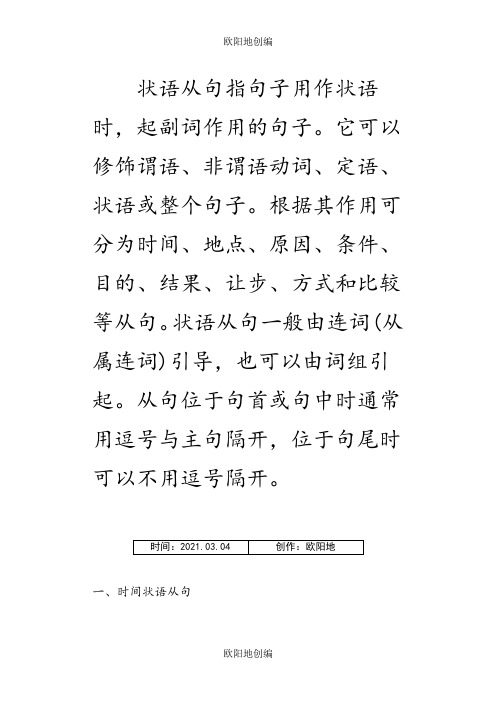
状语从句指句子用作状语时,起副词作用的句子。
它可以修饰谓语、非谓语动词、定语、状语或整个句子。
根据其作用可分为时间、地点、原因、条件、目的、结果、让步、方式和比较等从句。
状语从句一般由连词(从属连词)引导,也可以由词组引起。
从句位于句首或句中时通常用逗号与主句隔开,位于句尾时可以不用逗号隔开。
一、时间状语从句要点: 时间状语从句,由以下连词引导:when while as after before as soon as since till /until by the time 在时间状语从句中,要注意时态一致。
一般情况下主句是将来时的时候,从句要用一般现在时。
1.when当。
的时候mozart started writing music when he was four years old.(当)莫扎特的时候,开始写音乐作品。
2.while当。
时he visited a lot of places while he was traveling.他在旅途中参观了许多地方。
3.as在。
的同时;一边。
一边。
he smiled as he stood up.他一边站起来一边笑着。
4.after在。
之后he left the classroom after he had finished his homework the other day.前几天做完作业之后回的家。
5.before 在。
之前mr. brown had worked in a bank for a year before he came here.布朗先生来这之前已经在一家银行里工作一年了。
6.as soon as 一。
就。
we began to work as soon as we got there.我们一到那就开始工作。
i will write to you as soon as i get home.我一到家就给你写信。
7.since 自。
比较状语从句讲解及精选练习(附答案)之欧阳道创编
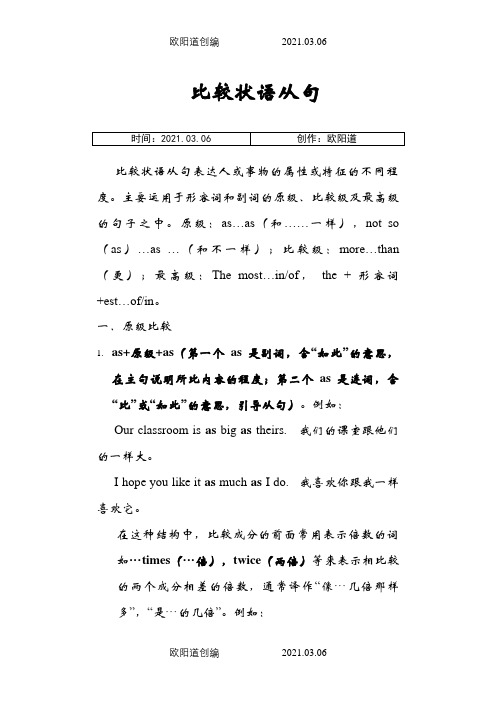
比较状语从句比较状语从句表达人或事物的属性或特征的不同程度。
主要运用于形容词和副词的原级、比较级及最高级的句子之中。
原级:as…as(和……一样),not so (as)…as …(和不一样);比较级:more…than (更);最高级:The most…in/of,the + 形容词+est…of/in。
一.原级比较1.as+原级+as(第一个as是副词,含“如此”的意思,在主句说明所比内容的程度;第二个as是连词,含“比”或“如此”的意思,引导从句)。
例如:Our classroom is as big as theirs. 我们的课室跟他们的一样大。
I hope you like it as much as I do. 我喜欢你跟我一样喜欢它。
在这种结构中,比较成分的前面常用表示倍数的词如···times(···倍),twice(两倍)等来表示相比较的两个成分相差的倍数,通常译作“像···几倍那样多”,“是···的几倍”。
例如:The speed of sounds in water is about four times as great as in air.声音在水中的速度是空气中的4倍左右。
This book is twice as thin as that one. 这本书的厚度是那本书的二分之一。
2.not so / as ···as(不像···那样,不如)。
第一个as/so是副词,在主句中作状语,修饰其后的形容词/副词;第二个as是连词,引导从句。
not so…as比not as…as用得比较普遍。
例如:It is not as easy as you think. 事情并不像你想的那么容易。
The work did not go so smoothly as we hoped. 这工作并不像我们希望的那样顺利。
初中英语状语从句讲解、练习与答案
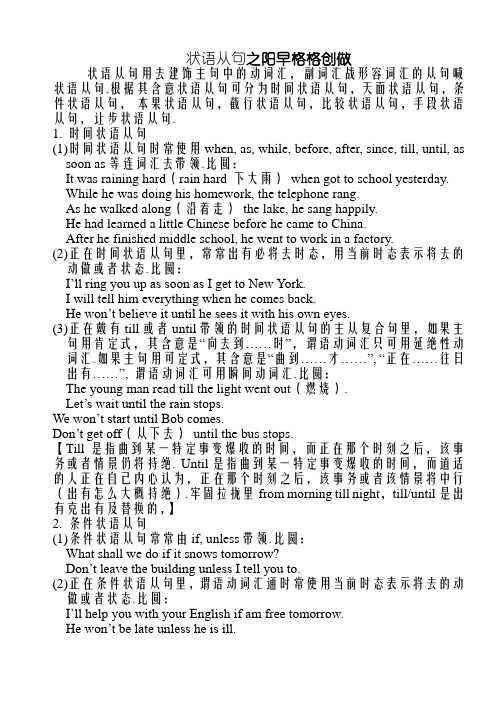
状语从句之阳早格格创做状语从句用去建饰主句中的动词汇,副词汇战形容词汇的从句喊状语从句.根据其含意状语从句可分为时间状语从句,天面状语从句,条件状语从句,本果状语从句,截行状语从句,比较状语从句,手段状语从句,让步状语从句.1. 时间状语从句(1)时间状语从句时常使用when, as, while, before, after, since, till, until, as soon as等连词汇去带领.比圆:It was raining hard(rain hard 下大雨)when got to school yesterday. While he was doing his homework, the telephone rang.As he walked along(沿着走)the lake, he sang happily.He had learned a little Chinese before he came to China.After he finished middle school, he went to work in a factory.(2)正在时间状语从句里,常常出有必将去时态,用当前时态表示将去的动做或者状态.比圆:I’ll ring you up as soon as I get to New York.I will tell him everything when he comes back.He won’t believe it until he sees it with his own eyes.(3)正在戴有till或者until带领的时间状语从句的主从复合句里,如果主句用肯定式,其含意是“向去到……时”,谓语动词汇只可用延绝性动词汇.如果主句用可定式,其含意是“曲到……才……”, “正在……往日出有……”, 谓语动词汇可用瞬间动词汇.比圆:The young man read till the light went out(燃烧).Let’s wait until the rain stops.We won’t start until Bob comes.Don’t get off(从下去)until the bus stops.【Till是指曲到某一特定事变爆收的时间,而正在那个时刻之后,该事务或者情景仍将持绝. Until是指曲到某一特定事变爆收的时间,而道话的人正在自己内心认为,正在那个时刻之后,该事务或者该情景将中行(出有怎么大概持绝).牢固拉拢里from morning till night,till/until是出有克出有及替换的,】2. 条件状语从句(1)条件状语从句常常由if, unless带领.比圆:What shall we do if it snows tomorrow?Don’t leave the building unless I tell you to.(2)正在条件状语从句里,谓语动词汇通时常使用当前时态表示将去的动做或者状态.比圆:I’ll help you with your English if am free tomorrow.He won’t be late unless he is ill.(3)“祈使句+ and (or)+ 报告句” 正在意义上相称于一个戴有条件状语从句的复合句.比圆:Hurry up, or you’ll be late.=If you don’t hurry up, you’ll be late.Study hard and you will pass the exam.=If you study hard, you will pass the exam.3. 本果状语从句(1)本果状语从句常常由because, since, as带领.比圆:He didn’t come to school because he was ill.As it is raining, we shall not (出有得;出有该该)go the zoo.Since you can’t answer the question, I’ll ask someon e else.(2)because表示曲交本果,语气最强.Because带领的本果状语从句多搁正在主句之后.回问由why提出的问题,只可用because.As战since语气较强,普遍用去表示明隐的本果.由as战since带领的本果状语从居多搁正在句尾.比圆:------Why aren’t going there?------Because I don’t want to.As he has no car, he can’t get there easily.Since we have no m oney, we can’t buy it.(3)because战so出有克出有及共用正在一个句子里.4. 截行状语从句(1)截行状语从句由so…that, such…that, so that带领.比圆:He is so poor that he can’t buy a bike for his son.She is such a good teacher that everybody likes her.My pencil fell under the desk, so that I cou ldn’t see it.(2)so…that语such...that不妨互换.比圆:正在由so...that带领的截行状语从句中,so是副词汇,取形容词汇连用.其结构是: “...so + 形容词汇(副词汇)+ that + 从句”.比圆:He was so glad that he couldn’t say a word.The hall is so big that it can hold 2,000 people.Mother lives so far away that we hardly ever(险些出有,从去出有)see her.正在由such…that带领的截行状语从句中,such是形容词汇,它建饰的不妨是单数或者复数可数名词汇,也不妨是出有成数名词汇;名词汇前里不妨戴形容词汇,也可出有戴.如果是单数可数名词汇,前里需加出有定冠词汇a或者an.比圆:It was such a hot day that nobody wanted to do anything.He had such long arms that he could almost touch the ceiling.(天花板)He made such rapid progress that he did very well in the mid-term.偶尔上述二种结构是不妨互换的.比圆:It was such a wonderful film that all of us wanted to see it again.=The film was so wonderful that all of us wanted to see it again.It is such an important match that nobody wants to miss it.=The match is so important that nobody wants to miss it.(3)如果名词汇前由many, much, little, few等词汇建饰时,只可用so, 出有必such.比圆:Soon there were so many deer that they ate up all the wild roses.He has so little time that he can’t go to the cinema(去瞅影戏)with you.5. 比较状语从句比较状语从句常常由as…as, 比较级+ than…等连词汇带领.比圆:Tom runs faster than John does.This classroom is as big as that one.6. 手段状语从句(1)手段状语从句常常由so that, in order that(为了,以便)带领.比圆:We started early so that we could catch the first train.He studies hard so that he could work better in the future.We used the computer in order that we might save time.(2)so that既可带领手段状语从句,又可带领截行状语从句.辨别那二种从句的办法有二个:1)手段状语从句里往往戴多情态动词汇can, could, may, might等.2)从意义上瞅,手段状语从句往往表示的手段很精确.比圆:Speak clearly so that they may understand you. (手段状语从句)Jack is badly ill so that he has to rest. (截行状语从句)7. 让步状语从句(1)让步状语从句常常由although, though等连词汇带领.比圆:Though he is young, he knows a lot.Although I am tired, I must go on working.(2)although(though)出有克出有及用正在共一个句子中.比圆:咱们出有克出有及道:Though it was raining hard, but he still went out.该当道:Though it was raining hard, he still went out.或者It was raining hard, but he still went out.8. 天面状语从句天面状语从句时常由where去带领.比圆:Go where you like.Where there is a will, there is a way.归纳:状语从句分类及时常使用连词汇:类型连词汇时间状语从句when, whenever, while, as, before, after, since, till, once(一朝)天面状语从句where, wherever本果状语从句because, since, as, for, now that(既然,由于)etc. (et cetera,等于and so on)手段状语从句in order that(为了,以便), so that, that, etc.截行状语从句so…that, so that, such…that, that, etc.条件状语从句if, unless, as(so)long as, etc.让步状语从句though, although, even if, even though, however, whatever, as,etc.比较状语从句as…as, so…as, than, etc.办法状语从句as, as if, as though, etc.训练一一. 单项挖空1. _______ he’s old, he can still carry this heavy bag.A. ThoughB. SinceC. ForD. So2. ---Do you know if he _______ to play basket ball with us?---I think he will come if he ______ free tomorrow.A. comes; isB. comes; will beC. will come; isD. will come; will be3. In the zoo if a child _____ into the water and can’t swim, the dolphins may come up ______ him.A. will fall; to helpB. falls; to helpC. will fall; helpD. falls; helping4. I don’t remember ________ he worked in that city when he was young.A. whatB. whichC. whereD. who5. We will stay at home if my aunt ________ to visit us tomorrow.A. comesB. comeC. will comeD. is coming6. The police asked the children _______ cross the street ________ the traffic lights turned green.A. not; beforeB. don’t; whenC. not to; untilD. not; after7. I was late for class yesterday _______ there was something wrong with my bike.A. whenB. thatC. untilD. because8. I’ll go swimming with you if I ________ free tomorrow.A. will beB. shall beC. amD. was9. In the exam, the ________ you are, ______ the _______ mistakes you will make.A. careful; littleB. more careful; fewestC. more careful; fewerD. more careful; less10. You should finish your lessons _______ you go out to play.A. beforeB. afterC. whenD. while11. I hurried _____ I wouldn’t be late for class.A. sinceB. so thatC. as ifD. unless12. When you read the book, you’d better make a mark _______ y ou have any questions.A. whichB. thatC. whereD. though13. The teacher raised his voice _______ all the students could hear him.A. forB. so thatC. becauseD. in order14. He took off his coat _______ he felt hot.A. becauseB. asC. ifD. since15. It is ______ that we’d like to go out for a walk.A. a lovely dayB. too lovely a dayC. so lovely a dayD. such lovelya day16. Mary had ______ much work to do that she stayed at her office all day.A. suchB. soC. tooD. very17. _______ I felt very tired, I tried to finish the work.A. AlthoughB. BecauseC. AsD. As if18. ______ the day went on, the weather got worse.A. WithB. SinceC. WhileD. As19. ______ well you can drive, you must drive carefully.A. So long asB. In order thatC. No matter howD. The moment20. Write to me as soon as you ________ to Beijing.A. will getB. getC. gettingD. got二. 根据华文意义完毕下列英语句子1. 出有管他跟尔启什么玩笑,尔皆出有气愤.I am not angry with him, _______ _______ ______ jokes he ______ on me.2. 布鲁斯太太对于教死非常亲切,以至于教死把她当干母亲.Mrs Bruce was _______ kind to her students ______ they ______ her _____ their mother.3. 只消咱们竭尽鼎力,女母便会谦意咱们的表示.Our parents will be pleased with our performance _____ _____ ______ we try our best.4. 您一到上海便给尔挨个电话佳吗?Will you please call me ______ ______ ______ you get to Shanghai.5. 那个七岁的女孩酷爱钢琴,以至于他已经脆持训练二年了.The seven-year-old girl likes playing the piano ______ ______ ______ she has kept practicing for two years.6. 虽然她很闲,他还脆持自教英语._______ _______ ______ _______, she kept on learning English by herself.7. 他少大后相称一名记者.He wants to be a journalist ______ _______ _______ _______.8. 无论刮风下雨,咱们的教授经常第一个到校._______ _______ windy or rainy, our teacher is always the first to get to school.9. 如果人人为呵护环境干出孝敬,天下将会变得更好佳.______ ______ ______ _____ _______ to protecting the environment, the world will become much more beautiful.10. 李明今天出去上教,果为他病了.Li Ming didn’t come to school _______ _______ ______ ______.训练二1 The meeting didn't start___ everyone was there.A. becauseB. untilC. whyD. if2 The boy ___ to bed ___ his mother came in.A. went not; untilB. didn't go; afterC. went; untilD. didn't go; until3 I won't believe you___ I have seen it with my own eyes.A. beforeB. untilC. afterD. when4 He ___ home ___ she was satisfied ___ his answer yesterday.A. didn't go; until; withB. wasn't go; after; toC. doesn't go; before; withD. didn't go; until; to5 He ___ back until the work ___ done.A. isn't; will beB. isn't; isC. won't be; will beD. won't be; is6 They didn't start the work ___ their teacher came back.A. untilB. whileC. as soon asD. if7. Tom will call me as soon as he ___ Shanghai.A. arrivesB. will reachC. arrives inD. get to8. I'm sure he'll come to see me before he ___ Beijing.A. will leaveB. is leavingC. leaveD. leaves9. I will tell him the news as soon as he___ back.A. comeB. comesC. will comeD. came10. Tom has got a watch. He ___ it for two years.It _______ by his father.A. has bought; was boughtB. has got; is bought ,C. was bought; has bought .D. has had; was bought "'11. When he got to the station, the train ___.A. leftB. had leftC. leavesD. has left12. The boy told his father what he ___ in the street.A. sawB. have seenC. had seenD. see13.We ___ TV when the telephone ____.A. watched; was ringingB. were watching; rangC. watch; ringsD. are watching; rang14.By the end of last term, I___ ten books.A. had finished readingB. have finish readingC. had finish to readD. finish read15. I ___ you for a long time. Where ___ you ___?A. didn't see; did; goB. didn't see; have; goneC. haven't seen; have; beenD. haven't seen; have; gone16. Tom___ China for 3 years.A. has beenB. has been inC. has been toD. has been at17. I won't go to see the film tonight, because I ___ my ticket.A. lostB. have lostC. will loseD. didn't lose18.-Hello! May I speak to Bob?-Sorry, but he ___ for a month.A. had been awayB. was leftC. leftD. has been away19. I ___ him since I began to live in the city.A. knowB. have knownC. knewD. will know20.Zhao Lan ___ already ___ in this school for two years.A. was; studyingB. will; studyC. has; studiedD. are; studying21.Betty didn't go to see the film yesterday ___ she was ill.A. becauseB. butC. untilD. if22 May I sit nearer___I can see more clearly?A. as ifB. so thatC. even ifD. so23 ___ you work hard, you will certainly succeed.A. ThoughB. IfC. BecauseD. For24 ___ he came to study in the university, he has made much progress in the study of English.A. WhileB. WhenC. SinceD. After25 I'd like to go swimming _____ the water is not too cold.A. forB. unlessC. ifD. whether26 There are ___ many league members in class 2 ___ in Class 4.A. both; andB. 'so; thatC. either; orD. as; as27. -Do you have a big library?-No, we don't. At least, not___yours.A. as big asB. as big thanC. as bigger thanD. bigger as28. Suzhou is not ____ beautiful ____ Hangzhou.A. as; thanB. so; asC. even; thanD. /; than29. Iron is more useful ___ any other metal.A. asB. thanC. thenD. so30. I want to know ___ she is going to see a film.A. ifB. thatC. whatD. which31. You are sure to pass the exam ___ you study hard.A. ifB. thoughC. thatD. since32. I'll go to see the film with you___I have time this evening.A. whetherB. soC. ifD. when33. ___ you study harder, you'll never pass the final exam.A. IfB. UntilC. UnlessD. Except34. Although it was raining, still worked in the fields.A. but theyB. and theyC. theyD. and yet they35 ___ there were only five soldiers left at the front, ___ they went on fighting.A. Because; soB. If; andC. Though; butD. Though; /36 ___ she is very old, ___ she can still work eight hours a day.A. Because; soB. Though; butC. As; yetD. Though; yet37. Please answer the question in a loud enough voice ___ all the class may hear.A. so, thatB. orC. in order thatD. and38. Lift it up___I may see it.A. though B. so that C. as D. than39. I hurried___I wouldn't be late for class.A. so B. so that C. if D. unless40. We should go by bus ___ we can get there earlier.A. as soon as B. where C. in order that D. as41 The dictionary is so expensive ___ I can't buy it.A. because B. when C. thatD. if42 I got there ___ late ___ I didn't see him.A. too; toB. such; thatC. so; thatD. so; as43 It is ___ hot in the room ___ we have to go out for a walk.A. such; thatB. so; thatC. as; asD. such; as44 He has___ an interesting book that we want to read it.A. so B. such C. the same D. as训练一问案一. 1.A 2.C 3.B 4.C 5.A 6.C 7.D 8.C 9.C 10.A二. 1. no matter what; plays 2.so; that; regarded; as 3. as long as 4. as long as5. so much that6. Though she was busy7. when he grows up8.Whether it’s 9. If everyone makes a contribution 10. because he was ill训练二参照问案:1-5B D B A D 6-10 AC D BD11-15B C B AC16-20B B D B C21-25A B B C C 26-30 D A B B A31-35 A C CC D36-40 D C B B C41-44 C C B B。
初中状语从句讲解及习题附答案
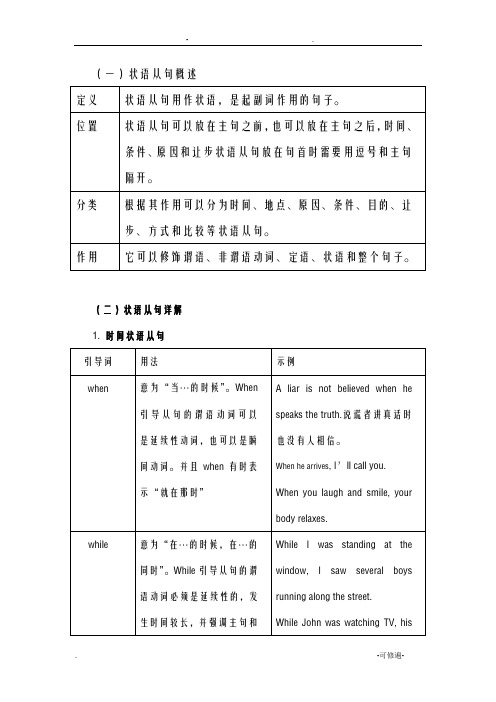
(一)状语从句概述(二)状语从句详解1. 时间状语从句2.地点状语从句3.条件状语从句4.原因状语从句5.目的状语从句6.结果状语从句7.让步状语从句8. 比较状语从句9.方式状语从句练习一一. 单项填空1. _______ he’s old, he can still carry this heavy bag.A. ThoughB. SinceC. ForD. So2. ---Do you know if he _______ to play basketball with us?---I think he will e if he ______ free tomorrow.A. es; isB. es; will beC. will e; isD. will e; will be3. In the zoo if a child _____ into the water and can’t swim, the dolphins may e up ______ him.A. will fall; to helpB. falls; to helpC. will fall; helpD. falls; helping4. I don’t remember ________ he worked in that city when he was young.A. whatB. whichC. whereD. who5. We will stay at home if my aunt ________ to visit us tomorrow.A. esB. eC. will eD. is ing6. The police asked the children _______ cross the street ________ the traffic lights turned green.A. not; beforeB. don’t; whenC. not to; untilD. not; after7. I was late for class yesterday _______ there was something wrong with my bike.A. whenB. thatC. untilD. because8. I’ll go swimming with you if I ________ free tomorrow.A. will beB. shall beC. amD. was9. In the exam, the ________ you are, ______ the _______ mistakes you will make.A. careful; littleB. more careful; fewestC. more careful; fewerD. more careful; less10. You should finish your lessons _______ you go out to play.A. beforeB. afterC. whenD. while11. I hurried _____ I wouldn’t be late for class.A. sinceB. so thatC. as ifD. unless12. When you read the book, you’d better make a mark _______ you have any questions.A. whichB. thatC. whereD. though13. The teacher raised his voice _______ all the students could hear him.A. forB. so thatC. becauseD. in order14. He took off his coat _______ he felt hot.A. becauseB. asC. ifD. since15. It is ______ that we’d like to go out for a walk.A. a lovely dayB. too lovely a dayC. so lovely a dayD. such lovely a day16. Mary had ______ much work to do that she stayed at her office all day.A. suchB. soC. tooD. very17. _______ I felt very tired, I tried to finish the work.A. AlthoughB. BecauseC. AsD. As if18. ______ the day went on, the weather got worse.A. WithB. SinceC. WhileD. As19. ______ well you can drive, you must drive carefully.A. So long asB. In order thatC. No matter howD. The moment20. Write to me as soon as you ________ to Beijing.A. will getB. getC. gettingD. got二. 根据中文意思完成下列英语句子1. 不管他跟我开什么玩笑,我都不生气。
when,while和as引导时间状语从句的用法之欧阳计创编

when, while 和 as 引导时间状语从句的用法一、when 的用法如果只从现象来看,when 从句用的最多的是一般过去时,而主句的时态没有限制,根据具体情况而定。
1. When he was a child he was always trying out new ideas.他小时候就常常试验一些新的设想。
2. When she came into my room, I was just reading a book.她走进我房间时,我正在看书。
3. Were you writing when the teacher came in? 老师进来的时候,你在写信吗?4. Sorry, I was out when you called me. 对不起,你打电话来的时候我出去了。
5. He was on the point of leaving when someone knockedat the door.他正要走,这时有人敲门。
6. I thought of it just when you opened your mouth. 就在你要说话的时候,我也想到了。
7. I had hardly[scarcely] closed my eyes when someoneknocked at the door.我刚一闭上眼,就有人在敲门了。
根据以上的例句,我们可以总结出一点:when 从句的A事件,相当于另一个事件B发生的时间点。
也就是说,when 从句的重点不在动作本身发生的状态,而只是把它作为一个时间点,所以when 多数情况下用的是一般过去时,则不用正在进行时。
因为如果用正在进行时,它表示的就是一段时间而不是一个时间点了。
根据这一点,有的文章补充说:when 从句的动词大多是瞬时动词。
这种说法也可以参照。
实际上,when 从句也可以有其它的时态,但几乎也不用进行时,因为它也只是作为一个时间参照点。
初中英语语法——三大从句汇总(重点笔记)之欧阳治创编

初中英语语法——三大从句汇总在英语中,主要有三大从句,即名词性从句(包括主语从句,宾语从句,表语从句,同位语从句)、形容词性从句(即定语从句)、副词性从句(即状语从句,包括时间、条件、结果、目的、原因、让步、地点、方式等)。
以下是一些基本的从句的语法知识点A、定语从句专项讲解与训练一、定语从句概念定语从句(attributive clause),顾名思义,就是一个句子作定语从属于主句。
定语一般是由形容词充当,所以定语从句又称作形容词从句。
另外,定语从句是由关系代词或关系副词引导的,故又称作关系从句。
定语从句一般放在它所修饰的名词或代词之后,这种名词或代词被称作先行词。
请看示例:The woman who lives next door is a teacher.先行词定语从句在所有的从句中,算定语从句最难掌握,因为汉语里没有定语从句,汉语里只有定语,而且总是放在名词之前来修饰名词。
二、关系代词引导的定语从句关系代词代替前面的先行词,并且在定语从句中充当句子成分,可以作主语、宾语、定语等。
常见的关系代词有:who, that, which。
它们的主格、宾格和所有格如下表所示:先行词主格宾格所有格人 who whom whose物 which which whose of which人、物 that that —(一)关系代词who, whom和 whose的用法who代替人,是主格,在定语从句中作主语。
例如:An architect is a person who designs buildings. 建筑师是设计房屋的人。
I will never forget the teacher who taught us chemistry in the first year of my senior middle school.我将永远不会忘记在高一时教我们化学的那位老师。
Anyone who wants to apply for this job must send us the resume by email first. 想应聘这个职位的任何人都必须先通过电子邮件向我们发送简历。
初中英语状语从句讲解、练习与答案(K12教育文档)
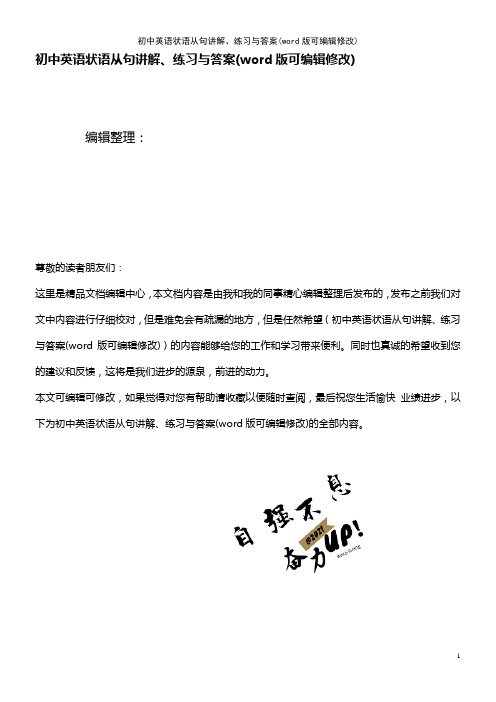
初中英语状语从句讲解、练习与答案(word版可编辑修改)编辑整理:尊敬的读者朋友们:这里是精品文档编辑中心,本文档内容是由我和我的同事精心编辑整理后发布的,发布之前我们对文中内容进行仔细校对,但是难免会有疏漏的地方,但是任然希望(初中英语状语从句讲解、练习与答案(word版可编辑修改))的内容能够给您的工作和学习带来便利。
同时也真诚的希望收到您的建议和反馈,这将是我们进步的源泉,前进的动力。
本文可编辑可修改,如果觉得对您有帮助请收藏以便随时查阅,最后祝您生活愉快业绩进步,以下为初中英语状语从句讲解、练习与答案(word版可编辑修改)的全部内容。
状语从句状语从句用来修饰主句中的动词,副词和形容词的从句叫状语从句。
根据其含义状语从句可分为时间状语从句,地点状语从句,条件状语从句,原因状语从句,结果状语从句,比较状语从句,目的状语从句,让步状语从句.1。
时间状语从句(1)时间状语从句常用when, as, while, before, after, since, till, until, as soon as等连词来引导。
例如:It was raining hard(rain hard 下大雨) when got to school yesterday。
While he was doing his homework, the telephone rang。
As he walked along(沿着走) the lake, he sang happily。
He had learned a little Chinese before he came to China.After he finished middle school, he went to work in a factory。
(2)在时间状语从句里,通常不用将来时态,用现在时态表示将来的动作或状态.例如:I’ll ring you up as soon as I get to New York。
- 1、下载文档前请自行甄别文档内容的完整性,平台不提供额外的编辑、内容补充、找答案等附加服务。
- 2、"仅部分预览"的文档,不可在线预览部分如存在完整性等问题,可反馈申请退款(可完整预览的文档不适用该条件!)。
- 3、如文档侵犯您的权益,请联系客服反馈,我们会尽快为您处理(人工客服工作时间:9:00-18:30)。
状语从句状语从句用来修饰主句中的动词,副词和形容词的从句叫状语从句。
根据其含义状语从句可分为时间状语从句,地点状语从句,条件状语从句,原因状语从句,结果状语从句,比较状语从句,目的状语从句,让步状语从句。
1. 时间状语从句(1)时间状语从句常用when, as, while, before, after, since, till, until, as soon as等连词来引导。
例如:It was raining hard(rain hard 下大雨) when got to school yesterday.While he was doing his homework, the telephone rang.As he walked along(沿着走)the lake, he sang happily.He had learned a little Chinese before he came to China.After he finished middle school, he went to work in a factory.(2)在时间状语从句里,通常不用将来时态,用现在时态表示将来的动作或状态。
例如:I’ll ring you up as soon as I get to New York.I will tell him everything when he comes back.He won’t believe it until he sees it with his own eyes.(3)在带有till或until引导的时间状语从句的主从复合句里,如果主句用肯定式,其含义是“一直到……时”,谓语动词只能用延续性动词。
如果主句用否定式,其含义是“直到……才……”, “在……以前不……”, 谓语动词可用瞬间动词。
例如:The young man read till the light went out(熄灭). Let’s wait until the rain stops.We won’t start until Bob comes.Don’t get off(从下来) until the bus stops.【Till是指直到某一特定事件发生的时候,而在那个时刻之后,该事情或状况仍将持续。
Until是指直到某一特定事件发生的时候,而讲话的人在自己心里认为,在那个时刻之后,该事情或该状况将中止(不怎么可能持续)。
固定组合里from morning till night,till/until是不能替换的,】2. 条件状语从句(1)条件状语从句通常由if, unless引导。
例如:What shall we do if it snows tomorrow?Don’t leave the building unless I tell you to. (2)在条件状语从句里,谓语动词通常用现在时态表示将来的动作或状态。
例如:I’ll help you with your English if am free tomorrow.He won’t be late unless he is ill.(3)“祈使句 + and (or)+ 陈述句” 在意思上相当于一个带有条件状语从句的复合句。
例如:Hurry up, or you’ll be late.=If you don’t hurry up, you’ll be late.Study hard and you will pass the exam. =If you study hard, you will pass the exam.3. 原因状语从句(1)原因状语从句通常由because, since, as引导。
例如:He didn’t come to school because he was ill.As it is raining, we shall not (不得;不应该)go the zoo.Since you can’t answer the question, I’ll ask someone else.(2)because表示直接原因,语气最强。
Because引导的原因状语从句多放在主句之后。
回答由why提出的问题,只能用because。
As和since语气较弱,一般用来表示明显的原因。
由as和since引导的原因状语从居多放在句首。
例如:------Why aren’t going there?------Because I don’t want to.As he has no car, he can’t get there easily.Since we have no money, we can’t buy it.(3)because和so不能同用在一个句子里。
4. 结果状语从句(1)结果状语从句由so…that, such…that, so that引导。
例如:He is so poor that he can’t buy a bike for his son.She is such a good teacher that everybody likes her.My pencil fell under the desk, so that I couldn’t see it.(2)so…that语such...that可以互换。
例如:在由so...that引导的结果状语从句中,so是副词,与形容词连用。
其结构是: “...so + 形容词(副词)+ that + 从句”。
例如:He was so glad that he couldn’t say a word.The hall is so big that it can hold 2,000 people. Mother lives so far away that we hardly ever(几乎不,从来不) see her.在由such…that引导的结果状语从句中,such是形容词,它修饰的可以是单数或复数可数名词,也可以是不可数名词;名词前面可以带形容词,也可不带。
如果是单数可数名词,前面需加不定冠词a或an。
例如:It was such a hot day that nobody wanted to do anything.He had such long arms that he could almost touch the ceiling.(天花板)He made such rapid progress that he did very well in the mid-term.有时上述两种结构是可以互换的。
例如:It was such a wonderful film that all of us wanted to see it again.=The film was so wonderful that all of us wanted to see it again.It is such an important match that nobody wants to miss it.=The match is so important that nobody wants to miss it.(3)如果名词前由many, much, little, few等词修饰时,只能用so, 不用such。
例如:Soon there were so many deer that they ate up all the wild roses.He has so little time that he can’t go to thecinema(去看电影) with you.5. 比较状语从句比较状语从句通常由as…as, 比较级+ than…等连词引导。
例如:Tom runs faster than John does.This classroom is as big as that one.6. 目的状语从句(1)目的状语从句通常由 so that, in order that(为了,以便)引导。
例如:We started early so that we could catch the firsttrain.He studies hard so that he could work better inthe future.We used the computer in order that we might savetime.(2)so that既可引导目的状语从句,又可引导结果状语从句。
区别这两种从句的办法有两个:1)目的状语从句里往往带有情态动词can, could, may, might等。
2)从意思上看,目的状语从句往往表示的目的很明确。
例如:Speak clearly so that they may understand you. (目的状语从句)Jack is badly ill so that he has to rest. (结果状语从句)7. 让步状语从句(1)让步状语从句通常由although, though等连词引导。
例如:Though he is young, he knows a lot.Although I am tired, I must go on working.(2)although(though)不能用在同一个句子中。
例如:我们不能说:Though it was raining hard, but hestill went out.应该说:Though it was raining hard, he still wentout.或It was raining hard, but he still went out.8. 地点状语从句地点状语从句常常由where来引导。
例如:Go where you like.Where there is a will, there is a way.总结:状语从句分类及常用连词:类别连词时间状语从句when, whenever, while, as, before, after, since, till, once(一旦)地点状语从句where, wherever 原因状语从句because, since, as, for, now that (既然,由于)etc. (et cetera,等于and so on)目的状语从句in order that(为了,以便), so that, that, etc. 结果状语从句so…that, so that, such…t hat, that, etc.条件状语从句if, unless, as(so)long as, etc. 让步状语从句though, although, even if, even though, however, whatever, as, etc. 比较状语从句as…as, so…as, than, etc. 方式状语从句as, as if, as though, etc. 练习一一. 单项填空1. _______ he’s old, he can still carry this heavy bag.A. ThoughB. SinceC. ForD. So2. ---Do you know if he _______ to play basket ball with us?---I think he will come if he ______ free tomorrow.A. comes; isB. comes; will beC. will come; isD. will come; will be3. In the zoo if a child _____ into the water and can’t swim, the dolphins may come up ______ him.A. will fall; to helpB. falls; to helpC. will fall; helpD. falls; helping4. I don’t remember ________ he worked in that city when he was young.A. whatB. whichC. whereD. who5. We will stay at home if my aunt ________ to visit us tomorrow.A. comesB. comeC. will comeD. is coming6. The police asked the children _______ cross the street ________ the traffic lights turned green.A. not; beforeB. don’t; whenC. not to; untilD. not; after7. I was late for class yesterday _______ there was something wrong with my bike.A. whenB. thatC. untilD. because8. I’ll go swimming with you if I ________ free tomorrow.A. will beB. shall beC. amD. was9. In the exam, the ________ you are, ______ the _______ mistakes you will make.A. careful; littleB. more careful; fewestC. more careful; fewerD. more careful; less10. You should finish your lessons _______ you go out to play.A. beforeB. afterC. whenD. while11. I hurried _____ I wouldn’t be late for class.A. sinceB. so thatC. as ifD. unless12. When you read the book, you’d better make a mark _______ you have any questions.A. whichB. thatC. whereD. though13. The teacher raised his voice _______ all the students could hear him.A. forB. so thatC. becauseD. in order14. He took off his coat _______ he felt hot.A. becauseB. asC. ifD. since15. It is ______ that we’d like to go out fo r a walk.A. a lovely dayB. too lovely a dayC. so lovely a dayD. such lovely a day16. Mary had ______ much work to do that she stayed at her office all day.A. suchB. soC. tooD. very17. _______ I felt very tired, I tried to finish the work.A. AlthoughB. BecauseC. AsD. As if18. ______ the day went on, the weather got worse.A. WithB. SinceC. WhileD. As19. ______ well you can drive, you must drive carefully.A. So long asB. In order thatC. No matter howD. The moment20. Write to me as soon as you ________ to Beijing.A. will getB. getC. gettingD. got二. 根据中文意思完成下列英语句子1. 不管他跟我开什么玩笑,我都不生气。
